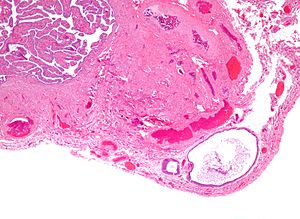Difference between revisions of "Walthard cell rest"
Jump to navigation
Jump to search
| Line 30: | Line 30: | ||
| Tx = none | | Tx = none | ||
}} | }} | ||
'''Walthard cell rest''', also '''Walthard cell nest''', is a benign finding | '''Walthard cell rest''', also '''Walthard cell nest''', is a benign finding often seen in [[gynecologic pathology]]. | ||
==General== | ==General== | ||
Revision as of 19:22, 7 March 2016
| Walthard cell rest | |
|---|---|
| Diagnosis in short | |
 A cystic Walthard cell rest of the fallopian tube. H&E stain. | |
|
| |
| LM | collection of eosinophilic (i.e. pink) cuboidal cells - usually solid, may be cystic; elliptical nucleus with single groove along major axis - "coffee bean" nucleus |
| LM DDx | Brenner tumour |
| Site | Fallopian tube, testis |
|
| |
| Syndromes | none |
|
| |
| Signs | none |
| Prevalence | common |
| Prognosis | benign |
| Treatment | none |
Walthard cell rest, also Walthard cell nest, is a benign finding often seen in gynecologic pathology.
General
Epidemiology
- Thought to be related to Brenner tumour.
Microscopic
Features:[2]
- Collection of eosinophilic (i.e. pink) cuboidal cells; usually solid, may be cystic.
- Elliptical nucleus with single groove along major axis; "coffee bean" nucleus -- key feature.
Location:
- Usually in soft tissue of the uterine tube.
DDx:
- Brenner tumour - consist of (multiple) nests with a surrounding fibromatous stroma.[3]
Images
Fallopian tube
Testis
See also
References
- ↑ Amin MB (February 2005). "Selected other problematic testicular and paratesticular lesions: rete testis neoplasms and pseudotumors, mesothelial lesions and secondary tumors". Mod. Pathol. 18 Suppl 2: S131–45. doi:10.1038/modpathol.3800314. PMID 15502808.
- ↑ Nucci, Marisa R.; Oliva, Esther (2009). Gynecologic Pathology: A Volume in Foundations in Diagnostic Pathology Series (1st ed.). Churchill Livingstone. pp. 332. ISBN 978-0443069208.
- ↑ Roma, AA.; Masand, RP. (Dec 2014). "Ovarian Brenner tumors and Walthard nests: a histologic and immunohistochemical study.". Hum Pathol 45 (12): 2417-22. doi:10.1016/j.humpath.2014.08.003. PMID 25281026.








